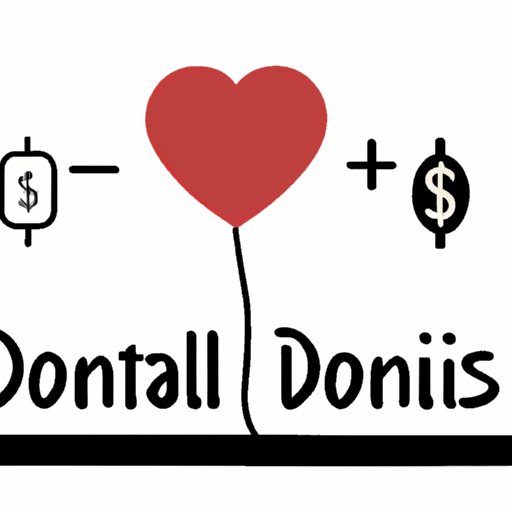
Introduction
Plasma donation is a way to earn extra cash while also helping people in need. Donating plasma is a simple process and can be done regularly with no long-term health effects. Plasma is used to create life-saving medications for people with health conditions such as immune deficiencies and hemophilia. In this article, we will be exploring how much money you can earn donating plasma, whether it’s worth your time, and the pros and cons of this kind of side hustle.
How Much Money Can You Earn Donating Plasma?
The amount of money you can earn for donating plasma varies based on several factors such as region, donation center, and frequency of donations. The average compensation rate in the United States ranges from $20 to $50 per donation, and some plasma centers offer compensation for first-time donors.
There are also bonus or incentive programs offered by plasma donation centers. For instance, you may be able to earn more money by donating more frequently or through a referral program. Donation centers may also offer promotions during times of high demand, such as cold and flu season.
When compared to other ways of making money, donating plasma is relatively easy. It can be done in as little as an hour, and you can donate several times a month. Some regular donors report making upwards of $400 per month.
Is Donating Plasma Worth Your Time?
Donating plasma requires a time commitment, but it can be worth it for those looking to supplement their income. Regular donors typically spend an hour and a half at the donation center, including a screening process. Donation centers may also be open on weekends and holidays, making it convenient for people who work during normal business hours.
When compared to traditional jobs, donating plasma may offer a higher hourly rate. For example, if you make $40 for a one-hour donation, that translates to $40 an hour. However, it’s important to note that donating plasma is not a reliable source of income as it is subject to a monthly cap, depending on the center.
Many people report that plasma donation is an enjoyable way to supplement their income. As plasma donation centers are located in most US cities, donating can be done without a significant travel commitment.
The Pros and Cons of Donating Plasma for Money
Donating plasma comes with both advantages and disadvantages. One of the benefits of donating plasma is that you can feel good knowing you’re helping others. Plasma is used to create medicines that treat rare and chronic medical conditions and help save lives. Another advantage is that donation centers usually have flexible hours, making it an ideal side hustle.
Drawbacks of donating plasma include the risk of infection from the process, as well as discomfort during the process. Some people may also experience lightheadedness or other side effects. However, these side effects are not common and can be managed with proper hydration and nourishment after the donation.
Maximizing Your Earnings from Plasma Donation
If you’re looking to earn the most money possible, it’s important to do your research. Some donation centers may pay higher rates, offer more bonuses or more conveniently located. Donation centers may also offer referral bonuses or loyalty programs, so it pays off to stick with one center. Signing up for newsletters or following centers on social media is an excellent way to stay informed about bonus opportunities.
Another way to maximize earnings is to qualify for bonus promotions offered by some centers. For example, a center may offer an extra $5 per donation for donors who come in twice per week or a bonus for returning donors during times of high need.
Why People Donate Plasma: Stories from Real Donors
People donate plasma for various reasons; some do it for the money, while others do it because they want to help others. One plasma donor mentioned that they donate because it’s a way to help others while simultaneously making some extra cash. For some donors, regular plasma donations have even become a part of their monthly routine.
Some plasma donors have been motivated to donate because of friends or family members who have been affected by health conditions that require plasma-derived medicines. For others, it’s a way to give back to the community without the commitment of volunteering at a community center.
The Ethics of Paying for Plasma Donations
There is a long-standing debate around compensating individuals for plasma donations. While some argue that it’s necessary to ensure an adequate and consistent plasma supply to create life-saving medicines, others argue that paying individuals for donations encourages people to put their health at risk.
Proponents of paying individuals for plasma donations argue that it ensures an adequate and consistent supply of plasma for life-saving medicines. Opponents argue that paid plasma donations incentivize people to compromise their health for money. Nevertheless, plasma donation remains legal, and many people continue to donate plasma as a source of income.
Alternatives to Plasma Donation for Supplementing Your Income
If plasma donation isn’t for you, fortunately, there are plenty of other ways to make some extra cash. Freelancing on platforms like Upwork or Fiverr is a great way to earn money using your skills. You can also earn money by pet-sitting or even taking online surveys. While these options aren’t as lucrative as plasma donation, they still provide an alternative way to supplement your income.
Conclusion
In this article, we’ve explored the world of plasma donation – how much money you can earn, what kind of time commitment it requires and whether or not it’s worth your time. For people looking to make some extra cash while also giving back to their community, donating plasma is an excellent option available in most US cities. While there are some downsides to plasma donation, such as the risk of infection, rewards such as feeling good about helping others almost make up for the time and discomfort it may entail.




